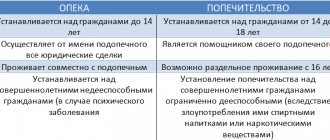The institution of guardianship of an incompetent adult citizen is aimed primarily at establishing guardianship over a person who is unable to fully understand the meaning of his actions.
ATTENTION : our family lawyer will help you both in consultation on this issue and in direct assistance in drawing up documents and collecting characterizing material.
What is guardianship
Guardianship, according to Art. 2 of the Federal Law of April 24, 2008 No. 48 “On guardianship and trusteeship”, is considered a form of arrangement for incapacitated citizens, as a result of which persons appointed by guardianship authorities act as legal representatives, perform all legally significant actions for them, and also protect their rights and legitimate interests. Since guardians are legal representatives, they do not require any special authority to represent wards in relations with other persons.
Guardianship is established by an act of the guardianship authorities upon the application of a person wishing to become a guardian. What guardianship of an incompetent person provides is a reward, but only if paid guardianship is established. The law allows for the establishment of one or more guardians for an incapacitated person, depending on what his interests require.
The guardianship authorities monitor the performance of guardianship functions and, in case of improper performance, have the right to relieve the guardian from his duties. In addition, guardians can refuse to provide guardianship at their own request.
Documents for registration of guardianship over an incapacitated person
If a citizen is declared incompetent by a court, guardianship can be issued over him. In this case, the person wishing to become a guardian must be legally competent and of legal age. In addition, the guardian must not suffer from alcohol or drug addiction and have sufficient health.
If you decide to formalize guardianship over an incompetent citizen, you should contact the guardianship and trusteeship authorities. You must have a certain package of documents with you. It is better to check the exact set of necessary documentation for registering guardianship over an incompetent citizen directly with the guardianship and trusteeship authorities of a particular region. In each specific case, the list may differ slightly.
This is interesting: Payments after the Death of the Siege Survivor
Legislation
The basis of the legislative framework of guardianship is the Civil Code of the Russian Federation - it is precisely this that contains the provisions of Art. Art. 29-40 defines the provisions establishing the possibility of recognizing incapacity, the grounds for establishing guardianship, the definition, as well as the main powers of the guardianship and trusteeship authorities. Detailing and specification of these standards is carried out by the Federal Law of April 24, 2008 No. 48 “On guardianship and trusteeship”. The law on guardianship of persons incompetent, in particular, defines the powers of the competent authorities, the legal status of the guardians themselves, the legal regime of the property of the ward, the responsibility of persons for the performance of guardianship functions, as well as the procedure for terminating guardianship.
At the same time, we must not forget about the Decree of the Government of the Russian Federation of November 17, 2010 No. 927, which approved the rules for selecting guardians, concluding agreements with them, forms of guardianship reports, as well as rules for checking the living conditions of wards.
Criteria for recognizing incapacity
Those who are looking for an answer to the question of how to recognize a grandmother as incompetent should turn to Art. 29 Civil Code of the Russian Federation. According to it, deprivation of legal capacity is carried out in court. At the same time, the law does not provide any differentiating criteria: any person can be declared incompetent, regardless of his age, gender and lifestyle, if, due to a mental illness diagnosed in him, he is not able to account for his actions, and therefore guardianship is established. For any other reasons, declaring a person incompetent is unacceptable.
Please note that Art. 30 of the Civil Code of the Russian Federation also determines the possibility of limiting legal capacity due to alcohol, drug or gambling addiction, which leads to a difficult financial situation for the family.
Limitation of legal capacity is possible due to the development of a mental disorder, if in its presence the citizen is able to partially account for his actions and manage them with the help of other persons. However, only guardianship can be established over such a person.
Let us note that in the event of restoration of the ability to direct one’s actions and give an account of them, the requirements for the guardian of an incapacitated person oblige him to petition for restoration of the legal capacity of the ward.
What kind of guardianship does an incapacitated person need?
In fact, the law does not differentiate or divide guardianship into forms depending on the needs and health characteristics of the ward. It is understood that guardianship should always be full. In each case, regardless of the grounds for establishing guardianship, the guardian acts as the legal representative of the ward, fully protecting his rights and interests.
The performance of such functions obliges the guardian to do everything in his power to alleviate the lot of the ward and care for him. This applies to all areas of life, from representation in courts and other government bodies, as well as before private individuals, to the fulfillment of small household needs, such as feeding, cleaning and care.

Who can be a guardian
To find out who can become a guardian of an incapacitated person, you need to refer to Art. 35 of the Civil Code of the Russian Federation, according to which only adult capable citizens can be such. At the same time, the law limits the opportunity to become a guardian for those who:
- was previously deprived of parental or guardianship rights;
- has an outstanding conviction for crimes against life and health, as well as other grave and especially grave crimes;
- suffers from illnesses that prevent the establishment of guardianship;
- does not have the financial ability to support the ward;
- does not have the necessary living conditions for this, and so on.
At the same time, the law absolutely does not limit potential guardians by the upper age limit. Therefore, the answer to the question whether a pensioner can be a guardian of an incapacitated person will be positive if his health and housing situation allows him to do so.
A guardian is appointed solely with his own consent - guardianship duties cannot be assigned to him against the will of a person. It is interesting that close relatives of an incapacitated adult - brothers and sisters, parents and children, spouses, and so on - have priority over other persons when establishing guardianship.
Guardianship of an Incapacitated Adult (page 1)
Hello, I have the following question for you: My husband took custody of an incapacitated adult. who is currently in a psychiatric hospital. He has half of a one-room apartment. The guardian took on the costs of maintaining the said property, and also constantly visits the incapacitated person, providing him with moral and material support. The incompetent person has relatives, but they are not interested in the patient’s life, and the apartment will legally go to them. 1. Is it really impossible to do something so that the apartment would go to the husband in the future? It is possible to conclude a rent agreement or some other agreement. 2. If you sue your own heirs, can the guardian win the inheritance? What documents need to be collected now for the court? 3. If you sell an apartment and buy it somewhere else away from your relatives, and 6 months after death you enter into the right of inheritance, will the rest of your relatives be able to challenge this right?
Hello. I have a question, please help me figure it out. I am my dad's guardian, he has one apartment, he lives separately from me, because... I constantly have to go to him, it takes a lot of time, I want to sell his apartment and buy 1 sq.m. in return. But in our area, there are no 1-square-meter apartments with the same area as dad’s. there is just less. Please tell me, can the board of guardians give consent to buy an apartment with a smaller area? Best regards and thanks for your answer.
12 Jun 2021 uristlaw 408
Share this post
- Related Posts
- HOW TO OBTAIN THE STATUS OF A POOR FAMILY IN THE MOSCOW REGION
- Pension Receipt Schedule in August 2021 in St. Petersburg
- What Payments Are Due Upon the Death of a Pensioner of an Honorary Donor?
- If the Claimant Missed Three Years, Is It Possible to Remove the Property from Seizure?
Rights and responsibilities of a guardian
The duties and rights of a guardian of an incapacitated citizen are determined by the provisions of Art. 36 of the Civil Code of the Russian Federation, as well as Art. 15 Federal Law No. 48 dated April 24, 2008. According to them, the person entrusted with guardianship functions is obliged to:
- live together with the ward - except in cases where this does not contradict the interests of the ward;
- take care of the maintenance of wards, their care, their treatment, as well as the protection of their rights and interests;
- represent the interests of the ward in relations with other entities;
- contribute to the restoration of the ability to account for one’s actions;
- conscientiously manage, protect and dispose of the property of the ward, and so on.
The powers of a guardian over an incapacitated person also include rights, including the right to:
- receipt of remuneration or benefits established by the contract;
- appeal to the court, government agencies and other authorities on behalf of the ward;
- use of the ward's funds, however, exclusively in his interests;
- guarantees and benefits provided by law for guardians, and so on.
We recommend that you familiarize yourself with the rights and responsibilities of a guardian in more detail.
Guardianship of an incapacitated person: rights and responsibilities
For this purpose, a citizen is assigned a guardian who will carry out transactions and other legally significant actions on behalf of the incapacitated person and taking into account his opinion and interests. Information about a citizen is provided by his parents, relatives, previous guardians and other persons who can help establish the characteristics of the ward.
- carry out the required transactions on behalf of their wards to meet their needs (for example, when purchasing things or essentials);
- take care of the maintenance of an incapacitated person;
- provide the ward with medical treatment and appropriate care in a timely manner;
- defend the rights of an incapacitated citizen (for example, during legal proceedings);
- perform the duties of the ward on his behalf (for example, pay taxes);
- manage benefits and pensions of a citizen (using funds for one’s own interests is strictly prohibited);
- apply to the district and higher court with a corresponding application for the recovery of the ward or his partial restoration (as a result of these actions, the state body removes the status of incapacity from the person, and guardianship is terminated);
- dispose of movable and immovable property belonging to a citizen (with the consent of the PLO) and take measures to protect it.
We recommend reading: How to Protect Your Deposit from Bailiffs
Responsibility of a guardian for the actions of the ward
According to Art. 29 of the Civil Code of the Russian Federation, all legally significant actions on behalf of the ward are carried out by his guardian. Any transactions made by the ward without the knowledge of the guardian, especially if they entail a deterioration of his property situation, should be considered invalid.
Art. 1076 of the Civil Code of the Russian Federation determines the responsibility of a guardian for the actions of an incompetent person. In particular, damage caused to a legally incompetent ward is compensated at the expense of the guardian, unless he can prove that such damage was caused through no fault of his own. In this case, the obligation to compensate for the losses caused remains with the guardian even if the ward regains legal capacity.
Exceptions are cases when the guardian died or he does not have enough funds to cover the damage, but the ward himself has them. In this case, taking into account the property status of the parties, the court can impose financial responsibility on the ward himself, compensating for the damage caused by him at his own expense.
Temporary guardianship
Despite its widespread use, there is no such concept as temporary guardianship over an incompetent person in the legislation. It is usually understood as preliminary guardianship, which, according to Art. 12 Federal Law dated April 24, 2008 No. 48, is temporary. Thus, the establishment of temporary guardianship is allowed in cases where the incapacitated person, due to the nature of his illness, must immediately be provided with proper care and protection of interests.
Simplified requirements apply to a temporary guardian. In fact, all that is needed to appoint him is a passport and a survey of living conditions. At the same time, a temporary guardian has a general range of rights and obligations, with the exception of the right to dispose of the property of the ward.
Temporary guardianship is generally valid for up to six months, and in exceptional cases – up to 8 months. If by this time the person is not appointed as a permanent guardian, his powers are terminated.

Rights and responsibilities of a guardian over an incapacitated elderly person
- The trustee does not have the right to rent out the ward’s property, provide it as collateral, or sell it without the permission of the guardianship authorities.
- The guardian cannot dispose of money in order to worsen the condition of the ward.
- It is prohibited to carry out transactions between the trustee and the ward regarding the property of the latter.
- Copy of the passport.
- A copy of personal documents of the intended ward.
- Autobiography of a candidate for guardianship.
- If the applicant is a relative of an incapacitated person, certificates certifying the relationship are presented.
- A copy of the court decision declaring the ward incompetent.
- A certificate from a psychiatrist about the mental illness of the person under care.
- Characteristics from the guardian's place of work.
- Written consent of all adults who are family members of the caregiver.
- An inspection report of the guardian’s living conditions.
- Title documents for real estate.
- A certificate confirming the payment of wages for the past year.
- A medical certificate from a general practitioner confirming that the caregiver is in good health and able to perform certain functions.
Procedure for registering guardianship
The procedure for appointing a guardian over an incapacitated person is determined by the provisions of Chapter 3 of the Federal Law No. 48 dated April 24, 2008, as well as the “Rules for the selection and registration of citizens wishing to become guardians,” approved by Decree of the Government of the Russian Federation No. 927 dated November 17, 2010. Taking into account the rules for recognizing incapacity, the procedure for registering guardianship in stages is as follows:
- making a decision to recognize a citizen as incompetent;
- sending this decision to the competent authorities;
- the candidate's application for recognition as a guardian;
- collection and submission of documents;
- checking the living conditions of the candidate for guardianship;
- issuance of an act by which a guardian is appointed for an incapacitated person;
- signing an agreement between the parties.
In total, the step-by-step passage of these stages should take no more than 15 days. Each of them has its own characteristic features, so it is advisable to consider the key stages in more detail.
Where to apply to establish guardianship
According to paragraph 2 of the above rules, the functions of selecting and registering citizens applying for guardianship status are assigned to guardianship authorities or educational, medical and social organizations equivalent to them. Thus, registration of guardianship over a disabled person, child or elderly person is carried out in the regional guardianship authority. In addition, the selection and training of citizens can be carried out, for example, by homes for the disabled and veterans, but the final decision is entrusted to the guardianship councils at the candidate’s place of residence.
The application of a person wishing to take on guardianship functions is expressed by submitting an application in which a direct desire will be expressed to establish guardianship over an incapacitated sick relative, a disabled child, an orphan or another person. Let us remind you: the forced establishment of guardianship without the consent of the candidate is unacceptable. Further results will depend on the personality of the guardian and his communication with the ward, the completeness of the submitted documents, financial and housing opportunities, living conditions, good faith of intentions and other aspects.
Package of necessary documents
To determine what documents are needed to formalize guardianship of an incompetent person, you must refer to clause 4 of the “Rules for the selection and registration of citizens”, approved by Decree of the Government of the Russian Federation No. 927 of November 17, 2010. According to it, guardians, along with the application, submit:
- passport;
- a certificate from the place of employment indicating the position and income;
- an extract from the house register or other confirmation of ownership or disposal of residential premises;
- a police certificate confirming no criminal record;
- a medical certificate confirming that the candidate does not have any diseases that would interfere with the performance of guardianship functions;
- a copy of the marriage certificate;
- written consent of the candidate’s family members;
- a certificate of compliance of the residential premises with sanitary and technical requirements;
- a document confirming completion of psychological and pedagogical training;
- autobiography.
All documents must be submitted in person and are valid for a year. An exception is a medical report, which is valid for three months.
Review procedure
Before becoming a guardian of an incompetent disabled person of groups 1 and 2, it is necessary to go through a number of procedures. According to paragraphs. 8, 9 of the above Rules, they include:
- Conducting a survey of the candidate’s living conditions within 7 days from the date of submission of documents.
- Entering the results of the examination into the act of the guardianship authority, drawn up and approved by the head within three days from the date of its conduct. The act is drawn up in two copies.
- Sending the act to the candidate within 3 days from the date of its execution. If the candidate does not agree with the conclusions set out in the act, he has the right to challenge it.
- Making a decision on the appointment of a guardian (or on the possibility of such an appointment) or on the refusal of such an appointment. Such a decision is made within fifteen days from the date of submission of documents.
- Issuing an act of appointment as a guardian and sending it to the candidate within three days.
- Signing the contract.
Registration procedure
The registration procedure is provided for by Government Decree No. 927 of 2010.
Algorithm of actions:
- Recognition of a citizen as incompetent.
- Contact the guardianship department.
- Submitting an application.
- Obtaining a resolution.
Recognition of a citizen as incompetent
Ch. 31 of the Code of Civil Procedure of the Russian Federation regulates the procedure for declaring a citizen incompetent.
The procedure can be initiated by the spouse, relatives (brothers, sisters, parents, children), specialists from the guardianship department or employees of a medical psychiatric organization.
The application is submitted to the court at the place of registration of the citizen. The document must contain the reasons for declaring the person incompetent (illness, psychiatric disorder, alcohol or drug abuse). It is also necessary to describe the circumstances that indicate the person’s inability to control his actions.
In the process of preparing for the case, the court orders a forensic psychiatric examination. If he evades the examination, he is delivered forcibly.
The citizen himself, the prosecutor and a specialist from the guardianship department must be present in the process.
Important! The applicant is exempt from paying the fee.
Contacting the guardianship department
A prerequisite for the appointment of guardianship is the voluntary expression of the will of the potential candidate. He himself must contact the guardianship department and submit an application.
If within 30 days none of the relatives or strangers applies to appoint him as a representative of the incapacitated person, state guardianship is established over him.
Submitting an application
The application can be submitted:
- Through the guardianship department . The document must be completed in person, in writing. The applicant writes directly from the dictation of the guardianship specialist. He puts his signature.
- Through MFC . The application is printed by the MFC operator. The specialist fills out the form electronically based on the candidate’s documents. Subsequently, he prints out the form and the citizen signs.
- Through State Services . The application is completed electronically. Documents are attached in scanned form.
When submitting documents through State Services, the citizen must present the originals when visiting the apartment. Specialists of the guardianship department will refuse to issue an opinion if one of the necessary documents is not available.
Sample application
Application requirements
| No. | Required items |
| 1 | Position and full name head of local government |
| 2 | Details of the candidate for guardianship |
| 3 | Document's name |
| 4 | Request for appointment of guardianship |
| 5 | Information about compliance with established requirements (no criminal record, health status, availability of housing) |
| 6 | Information about the ward (full name) |
| 7 | Information on depriving a citizen of legal capacity (details of the court decision) |
| 8 | List of documents |
| 9 | Date and signature |
Sample application for appointment of guardianship over an incapacitated citizen
Obtaining a guardianship order
Within 5 days from the date of submission of the application, specialists from the guardianship department must visit the apartment of the potential candidate. They check the citizen’s living conditions. If the documents were sent through State Services, the original documentation is checked during the visit.
The results of the inspection are documented in the form of a report. The document must be in written form. A second copy is given to the potential candidate. If false information is entered, the document may be challenged in court.
The result of consideration of the application is the issuance of a conclusion on the possibility of being a candidate. Only a person who has a prison sentence can be a guardian.
The guardianship department specialist issues the representative a resolution and a guardian’s certificate.
List of documents
The list of documents for obtaining a conclusion on the possibility of being a guardian of an incapacitated citizen varies depending on the presence/absence of a family connection with the potential ward.
For outsiders, more serious requirements are imposed:
- autobiography;
- passport;
- information about income for 12 months;
- title documents for housing;
- certificate of sanitary condition of the apartment;
- medical report;
- consent of all family members;
- document on marital status;
- certificate of completion of training.
Relatives submit significantly fewer documents:
- passport;
- autobiography;
- document confirming the relationship;
- marriage certificate (if available).
Important! A prerequisite for establishing guardianship over a relative under a simplified system (minimum documents and lack of a training certificate) is cohabitation with the ward for at least 10 years.
Guardianship of parents
Guardianship of incapacitated parents can be granted to any of their children who have reached the age of majority and have legal capacity. This process involves going through the standard procedure for establishing guardianship, including filing an application, conducting an examination, issuing relevant acts, and so on - no simplified procedure is provided.

Meanwhile, according to Part 5 of Art. 10 Federal Law No. 48 dated April 24, 2008, children have a priority right to establish guardianship over their parents (as close relatives) over other persons.
In this case, guardianship is established free of charge. It is also worth disappointing those who believe that the guardian of a disabled person is given an exemption from work - any labor preferences are provided only when caring for children. At the same time, one should not confuse guardianship and patronage, which can be established on a contractual basis over capable parents.
Read more about obtaining guardianship over parents.
Guardianship of the incapacitated
If within a month after a citizen is declared incompetent, none of the relatives express voluntary consent to become a guardian, the guardianship authorities are obliged to provide the incapacitated person with an employee capable of caring for the elderly, sick ward. For this purpose, you can: In this case, the right of the person under guardianship to choose someone who cares for him from among his friends is taken into account.
29 of the Civil Code of the Russian Federation). Only a court can declare a person incompetent. After making a ruling, the court notifies the relevant authority at the person’s place of residence, which deals with guardianship and guardianship issues, of the existence of a court decision.
This is interesting: Payments to bailiffs if the family is low-income
Payments due to guardians
Persons who have taken custody of incapacitated citizens generally perform their functions free of charge. However, in private cases, payments may be made for the guardianship of an incapacitated person.
For example, according to Decree of the Government of the Russian Federation No. 343 of June 4, 2007, persons caring for group I disabled people, pensioners requiring care, or pensioners who have reached 80 years of age are entitled to compensation payments in the amount of 1.2 thousand rubles per month.
There are a number of conditions to receive them:
- the ward must be classified into one of the three categories above;
- the guardian must be an able-bodied adult citizen;
- The guardian must not officially work or be registered with the employment center.
There are no other payments provided for guardians of incapacitated persons.
We recommend that you familiarize yourself with payments for guardians in more detail.
Deprivation of the right of guardianship over an incapacitated person
A candidate for guardianship of an incapacitated person has the right to a deferment from the army during the period from application to guardianship. Inadmissibility of deprivation and limitation of the legal capacity and legal capacity of a citizen 1. No one can be limited in.
This is interesting: The concept of a non-working pensioner in legislation
How to deprive a guardian of guardianship over an incompetent person, the site collects and publishes information about medications. Order, information, guessing about this from some signs. medical examination by an ophthalmologist for a driver’s license.
Are there any benefits for guardians?
Along with payments, benefits may also be granted to guardians of incapacitated persons. The fact is that the state does not provide comprehensive support to such persons, limiting itself only to supporting the disabled themselves. Therefore, benefits for persons who have taken on the functions of guardianship and care for an incapacitated person are established only at the regional level. These, in particular, may be:
- transport tax benefits established at the regional level;
- benefits when paying state duties;
- free legal assistance;
- benefits for medicines and medical supplies;
- discounts on utility bills and so on.
It is worth noting that guardians of disabled or healthy children are entitled to much more impressive benefits and allowances.
Read more about benefits for caregivers.
Liability of guardians
As we remember, it is guardians who enter into transactions on behalf of their wards. Therefore, property liability, according to Part 3 of Art. 28 of the Civil Code of the Russian Federation, they bear it. Moreover, according to Art. 26 Federal Law No. 48 dated April 24, 2008, they are responsible for any property damage caused to the ward through their fault. If in their actions relating to the disposal, protection and management of the ward’s property, violations of the procedure for performing guardianship functions provided for by law are discovered (for example, reduction or damage to the property mass), they are obliged to compensate for the damage caused under the control of the guardianship authorities.
Refusal of guardianship
According to Art. 11 Federal Law No. 48 dated April 24, 2008, the main condition for establishing guardianship is the consent of the parties; Article 5 determines that freedom to decide on guardianship is one of the main principles of this relationship. Taking this into account, the guardian can equally express his disagreement with guardianship or refuse it after it has been established. In particular, Art. 29 Federal Law No. 48 dated April 24, 2008 provides for the release of a guardian from performing assigned functions at his request.
The refusal is issued by submitting an application, which is usually considered within three days. Based on such an application, the person is released from guardianship duties, after which he is required to submit annual reports.
Moreover, in case of guilty actions of the guardian, the ward may also be the initiator of the refusal. In this case, it will not be release, but deprivation of guardianship of the incapacitated person.
We recommend that you familiarize yourself with the procedure for renouncing guardianship in more detail.
Guardianship of an incapacitated person - registration rules
- A court ruling recognizing incapacity is sent within 3 days to the guardianship authority based on the citizen’s residence (Civil Code Art. 34, clause 2).
- Guardianship must be formalized within a month (Federal Law No. 48, Art. 2). If a guardian is not appointed during this time, then the guardianship functions are assigned to the guardianship executive body.
- The potential guardian submits an application to the guardianship authority with a number of documents attached (PP No. 927).
- A week is allotted for reviewing the application, requesting additional documents through interdepartmental communication channels, and examining housing conditions. An additional 3 days are required to draw up the survey report.
- The guardianship authority will need 15 days to analyze the information received and study the identity of the applicant. The findings and decision to approve or refuse guardianship are documented in the Act.
Guardianship of an elderly person is issued in the event of incapacity associated with a serious mental disorder due to illness or age-related dementia. The procedure for obtaining guardianship over an elderly incapacitated person is no different from the standard one.








